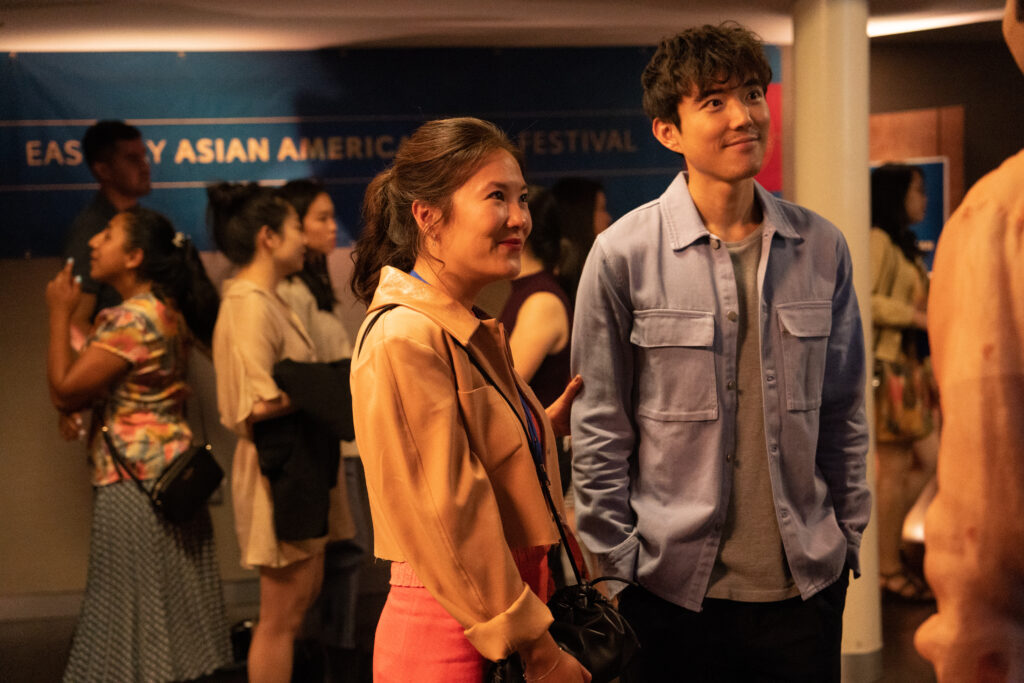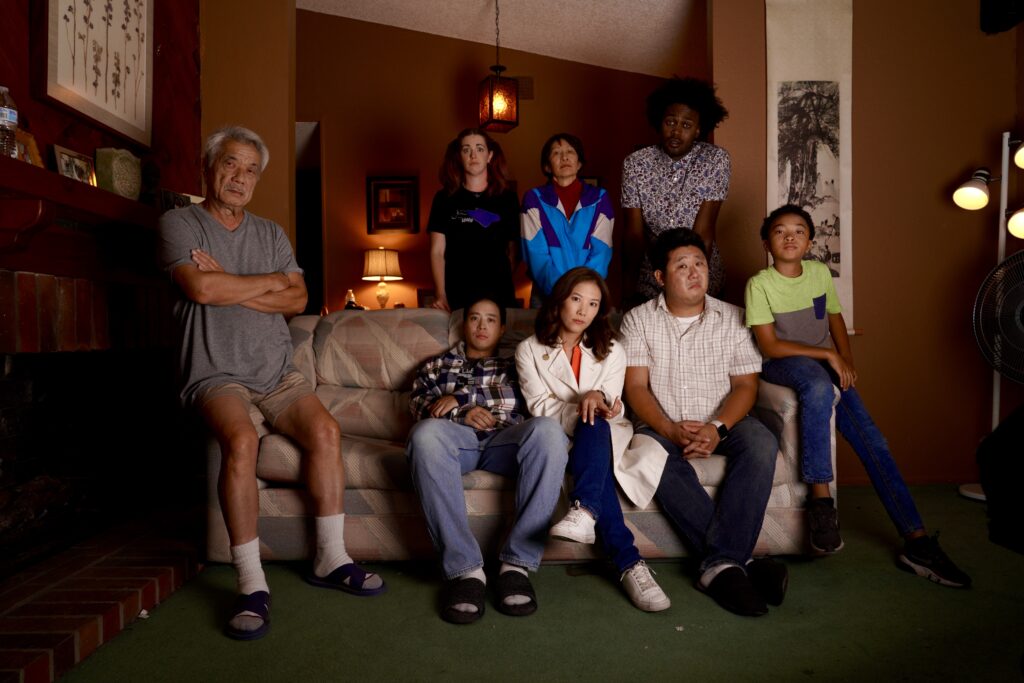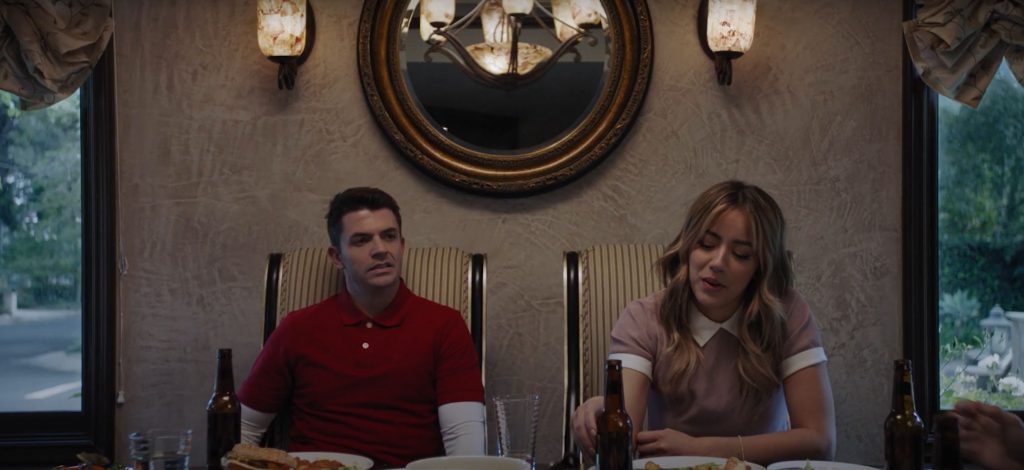October 22, 2023
by Carla Hay

Directed by Randall Park
Culture Representation: Taking place in the San Francisco Bay Area and in New York City, the comedy film “Shortcomings” (based on the graphic novel of the same name) features an Asian and white cast of characters portraying the working-class and middle-class.
Culture Clash: After an aspiring filmmaker and his girlfriend agree to take a break from each other while she does an internship in New York City, he and his semi-closeted lesbian best friend have various experiences in the dating scene.
Culture Audience: “Shortcomings” will appeal primarily to people who are interested in watching movies about single people looking for love and having a lot of quip-filled banter about their relationships.

“Shortcomings” avoids romantic comedy clichés by not focusing on who’s going to be in a happy romance at the end. It’s a mostly entertaining character study of about a cynical grouch and his lesbian best friend, as they navigate the dating scene. “Shortcomings” is neither a classic film, nor is it an awful movie that’s a waste of time. It’s somewhere in between, as a movie that’s a fairly good option for people who are inclined to like movies where most of the scenes are people talking about themselves and their love lives.
Randall Park, who is best known as a comedic actor (he was a star of the 2015-2020 comedy TV series “Fresh Off the Boat”), makes his feature-film directorial debut with “Shortcomings,” a witty and occasionally sitcom-ish examination of unmarried people with a jaded attitude that often masks the hope of finding true love. (Park has a cameo in the movie as a waiter named Ji-Hun.) “Shortcomings” is based on the 2007 graphic novel of the same name by Adrian Tomine, who adapted the book into the “Shortcomings” screenplay. “Shortcomings” had its world premiere at the 2023 Sundance Film Festival and its New York premiere at the 2023 Tribeca Festival.
In the beginning of “Shortcomings,” aspiring filmmaker Ben Takanaka (played by Justin H. Min) and his girlfriend Miko Higashi (played by Ally Maki), who are both Japanese American and in their late 20s, are watching a romantic comedy at a movie theater in Berkeley, California, where they live. The movie they are watching is an unimaginative ripoff of “Crazy Rich Asians,” and it’s playing as part of the East Bay Asian American Film Festival. Miko is one of the programmers of the festival, so she’s thrilled that this movie is there.
After the screening in the theater lobby, Miko says to Ben: “As a community, we waited a long time to see ourselves reflected in a …” Ben then interrupts and finishes the sentence by saying, “A garish, mainstream rom com that glorifies the capitalistic fantasy of validation through wealth and materialism?” Miko looks slightly offended, but she’s become accustomed to Ben making cutting remarks when he doesn’t approve of something. Viewers will find out that Ben doesn’t approve of a lot of things.
Miko and Ben live together and have been dating each other for six years. Ben has issues with Miko recently having a political awakening about her Asian heritage and being more outspoken about Asian representation in many aspects of life. Ben (who occasionally talks out loud to himself and the “Shortcoming” viewers) says of Miko’s newfound political awakening: “She’s doing it because it’s trendy.”
It should come as no surprise that Ben and Miko have not been getting along with each other lately. Most of their arguments are about Ben thinking that Miko is some kind of “sellout,” while Miko thinks that Ben is jealous that her career has been advancing in the movie industry while his has not. Ben works as a manager of a local movie theater called Berkeley Arts Cinema.
Ben and Miko also have very different attitudes when it comes to love and marriage. Miko eventually wants to settle down and get married. She thinks that marriage should be the next step in her relationship with Ben. Ben doesn’t think they need to get married to prove anything. They’ve reached a stalemate regarding this issue.
Miko also has a problem with what she thinks is Ben’s sexual obsession with white women, especially pretty blondes. Ben denies it, but Miko gets triggered when she finds out that Ben has been looking at porn that only has white people in it. Ben thinks she’s overreacting and says it’s ridiculous for Miko to think he can only look at porn with Asian people in it. However, Miko is correct about Ben having an attraction to pretty blondes, based on who becomes his two love interests later in the movie.
And so, when Miko tells Ben that she has accepted an opportunity to do a three-month internship at the Asian American Film Institute in New York City, Ben and Miko mutually agree that they should take a break from their relationship. During this break, they can date other people and figure out after Miko’s internship ends if they should become a couple again or break up permanently. Ben sees it as a chance to explore the dating scene and see what he’s been missing.
Meanwhile, Ben’s best friend is Alice Lee (played by Sherry Cola), a Korean American lesbian who hasn’t told her conservative parents about her true sexuality. Alice not only hasn’t told her parents, she also deliberately misleads them into thinking that she dates men. As shown in the “Shortcomings” trailer, Alice pretends that Ben is her boyfriend when she introduces him to her parents (played by Borah Ahn and David Niu), who don’t have names in the movie.
Ben, who is a self-described movie snob, manages a small staff at Berkeley Arts Cinema. The employees he supervises include two self-admitted movie geeks who are concessions workers: talkative Gene (played by Jacob Batalon) and laid-back Lamont (played by Scott Seiss), who have constant debates and other discussions about movies. In a very meta joke, Gene mentions in one of these conversations that he prefers the “new Spider-Man.” (In real life, Batalon is a co-star of the “Spider-Man” movies starring Tom Holland.)
A new employee who has joined the team has caught the romantic interest of Ben. Her name is Autumn (played by Tavi Gevinson), a hipster who works in the theater’s box office. Ben wants to date her, but he’s also aware of how tricky it can be for a supervisor to date someone who reports to the supervisor. Autumn invites Ben to an avant-garde spoken-word performance that she is doing, and it’s Ben’s chance to see if this could possibly lead to a romance with Autumn, or if she wants to keep the relationship strictly platonic.
Around the same time, Ben meets down-to-earth Sasha (played by Debby Ryan) at a house party where Alice is also in attendance. One of the first things that Sasha says to Ben is: “We’re probably the only two people at this party whom Alice Lee has not seduced.” Sasha also confirms that she’s bisexual when Sasha tells Ben that she’s single and available after breaking up with her most recent girlfriend two months ago. Ben and Sasha have an instant attraction to each other, but Alice tells Ben not to date Sasha, whom Alice calls a “fence sitter.”
As already shown in the “Shortcomings” trailer, Alice decides to move to New York City. What’s not shown in the trailer: Alice moves to New York City because she got expelled from grad school for kicking another student in the vagina during an argument. This violent incident is not shown in the movie. While in New York City, Alice’s life changes when she meets another queer woman named Meredith (played by Sonoya Mizuno), and they quickly become involved with each other.
Ben decides to visit New York City, partly to hang out with Alice, and partly to spy on Miko. This is where the movie gets into sitcom-ish territory. Ben gets jealous after finding out that Miko has started dating a guy named Leo Alexander (played by Timothy Simons), who met Miko through Leo’s filmmaker friend whose movie was at the East Bay Asian American Film Festival. (Miko dating Leo is also revealed in the “Shortcomings” trailer.)
There really isn’t much of a plot to “Shortcomings,” whose appeal is mainly in watching how these characters interact with each other. The best scenes, of course, are those with Ben and Alice, who feel comfortable enough with each other to tell each other exactly how they feel. It’s in contrast to how Ben puts on more of a “nice guy” front as being sensitive and insecure when he’s dating someone new. He’s much more acerbic and pessimistic when people get to know him better and he shows his true personality.
It’s through the characters of Ben and Alice that viewers see how people often present themselves one way to certain people and another way to other people. Min handles his role as the often-unlikable Ben with considerable aplomb. Ben is not a “villain,” but he’s deliberately portrayed as a very flawed, self-sabotaging individual who hasn’t figured out yet that he’s going to have a hard time finding true love if he doesn’t love himself.
In the role of Alice, Cola has impeccable comedic timing and makes her banter scenes with Min have creative sparks of energy that are enjoyable to watch. The friendship between Ben and Alice is more meaningful than many of the romantic relationships shown in the movie. Overall, “Shortcomings” can be an amusing and realistic look at people’s personality quirks and insecurities that often get amplified (or covered up) when they go through the ups and downs of dating. It’s the type of movie that succeeds in its intention of making viewers laugh and feel uncomfortable at the same time, with an ending that is entirely authentic.
Sony Pictures Classics released “Shortcomings” in select U.S. cinemas on August 4, 2023. The movie was released on digital and VOD on September 14, 2023, and on Blu-ray and DVD on October 17, 2023.




